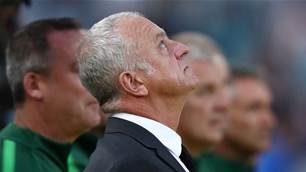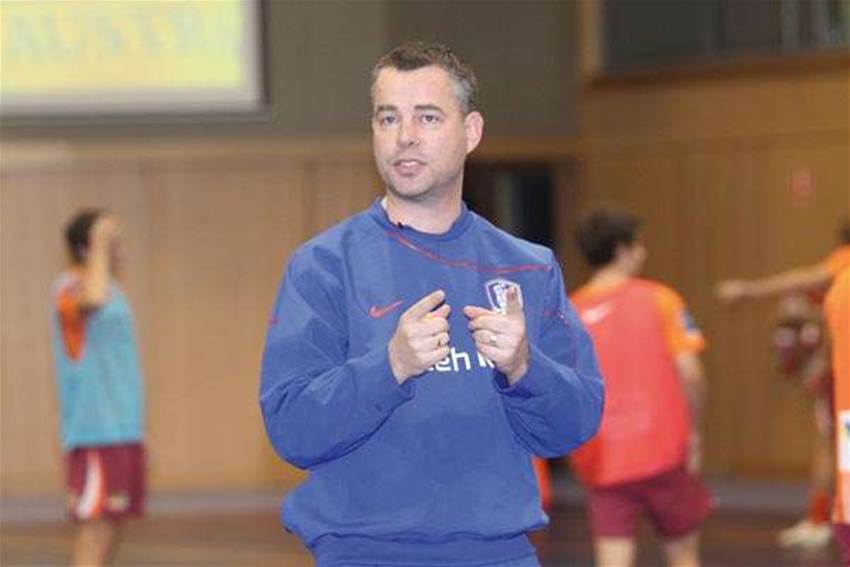Meet Raymond Verheijen – an outspoken advisor to A-League clubs and FFA
You have said in the past that “Australian football is being strangled by non-football fitness coaches who run players into the ground and spoil football time”.
When I was first invited by FFA in 2009 they explained to me that football in Australia has a serious problem in terms of football fitness. The people of FFA described the problem to me that even at lower level and junior level, fitness coaches are doing isolated training and losing football time. Australia wants to catch up with the big nations and the main area that needs improvement is the technical and tactical area. These areas can only be improved by training football. So, the more time you spend in isolation, the less time you have to catch up with the big nations in terms of technique and tactics. That is how it was explained to me and that was the main reason I was invited to Australia, as my philosophy is to develop fitness as part of football training. This is more ‘training time efficient’ as football and fitness are developed at the same time. I have now visited Australia five times, met lots of people from across Australia and they were all saying the same thing as FFA.
You asked what century Newcastle Jets coach Branko Culina is from and suggested there is still a long way to go in Australia after details of their pre-season, which involved running up sand dunes, was revealed.
I only use those examples to illustrate the bigger picture. In the context of the Newcastle Jets this pre-season is no problem as it is the choice and responsibility of the head coach.
But in the context of the future of football in Australia, the media attention for this pre-season is detrimental as other coaches might copy these methods which would mean players will have less football time.
Some people in Australia might say you are “anti-sport scientist”. Is that true?
I think sport science has a lot to offer to football, potentially. It is also true that Australia is one of the world leaders in sport science. And it is logical that every country tries to use its strengths to reach the top. But people should understand that sport science is not the solution to develop Australia into a top 10 football country in the world. Thankfully, technical director Han Berger and his staff have developed the new football curriculum which will bring football in Australia to the next level.
Clubs who you have been vocal about in the past include Chelsea, Arsenal, Tottenham and Manchester City – what has been your objection to their methods?
The main reason for injuries in football is accumulation of fatigue. Injuries do not happen because of bad luck! Football players have made football actions all their lives. All of a sudden a hamstring or ligament snaps and that has to do with the status of the body at that particular moment: fatigued! The next question is: where is this accumulation of fatigue coming from? The main reason is imbalanced planning of training. It is very important that you are doing the right football training at the right moment and in the right sequence. As an example, if you play four versus four in training today, which is very demanding on the body, you will definitely be tired the next day. If you do sprint training or shooting exercises the next day, then an already fatigued body, with fatigued muscles, is doing more maximum explosive actions in a higher frequency than they normally would in a game. You are asking for trouble. You are overloading a fatigued body. This is just a simple example, but it is all about planning the right exercises, in the right sequence, at the right time, to avoid fatigue and injuries.
Wales recently hosted the Socceroos in Cardiff – what did you make of the Australians?
I said this to Holger Osieck and Aurelio Vidmar afterwards too – I was impressed. Australia did really well. They were well organised, they kept compact and were disciplined in defence. When in possession they had plenty of movement with the wingers coming inside and the full-backs getting high up the pitch. There was also a lot of variation from Australia. They knew exactly what they were doing. I also like the chemistry between the players and the coaching staff.
What does the future hold in terms of your involvement with FFA and Australia?
FFA have asked me to follow-up on my involvement on the coaching courses in 2012. I will probably be involved in the Euro 2012 Championships though, so I will have to see which country I work with there and what my schedule will be. Once I know my 2012 schedule, we will definitely do some follow-up courses in Australia.
This article appeared in the November 2011 issue of Australian FourFourTwo magazine. To buy back copies of this issue call 03-8317-8121 with a credit card to hand.
The current edition of Australian FourFourTwo has just gone on sale in newsagent across the country, or you can subscribe here
Related Articles

Backlash over Fox Sports new season launch

W-League, A-League set for world-first equal marketing split













